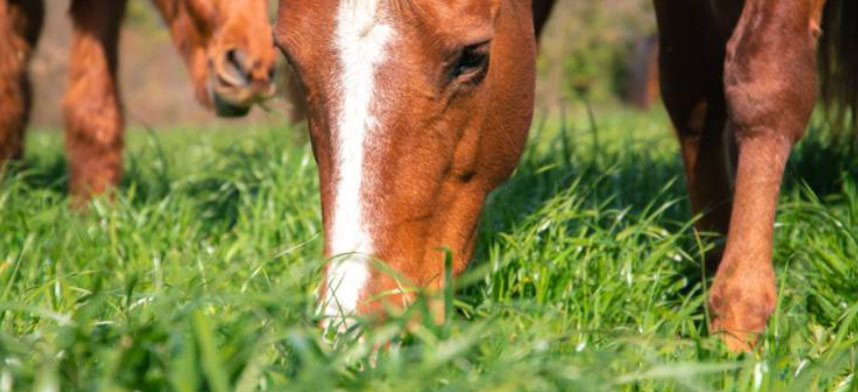
By Kentucky Equine Research Staff
Horse owners are often advised to manage obese horses with caloric restriction, which typically includes limiting access to pasture. Because grazing, access to free-choice exercise, and social interactions all allow horses to express normal behaviors, researchers are now wondering if there is a way to restrict pasture access without affecting welfare?*
Obese horses have an increased risk of metabolic syndrome characterized by insulin dysregulation. In turn, horses with increased levels of circulating insulin are at risk of developing hyperinsulinemia-associated laminitis, a painful and life-threatening condition of the feet.
“Weight management is by far the most important and most widely recommended approach to managing insulin dysregulation and obesity,” explained Ashley Fowler, Ph.D., a nutritionist for Kentucky Equine Research. “However, restricting grazing with muzzles or drylots can sometimes be difficult for owners to implement due to lack of available land for sacrifice areas or because some horses are incredibly clever at removing their grazing muzzles.”
When given the chance, horses spend about two-thirds of their day grazing, and according to veterinary researchers, grazing is a “central and innate facet of equine behavior.”*
Restricting grazing may lead to frustration as well as problematic or abnormal behavior, including aggression and stereotypic behaviors.
Two systems are often recommended for restricted grazing:
- Strip grazing, which involves limiting horses to a specific grazing area that is increased in size over time by moving fencing to reveal ungrazed grass.
- Track systems that involve creating a track around the perimeter of the grazing area that can be gradually increased in size.
To determine the effects of these two restricted grazing systems on behavior of outdoor-living ponies, researchers used 24-hour electronic surveillance and GPS data loggers attached to a halter to track activity levels. Data was collected over four weeks.
Key findings included:
- Ponies spent most of their time grazing regardless of the system;
- More ponies showed agonistic behavior (i.e., conflict or fighting) in the strip grazing system than ponies in the track system; and
- Ponies moved significantly more in the track system. “This could be due to a more enriched environment, less competition over resources or improved social cohesion,” said the research team.
“This research highlights the potential benefits of a track system on weight management, by both limiting grass access and encouraging more movement,” explained Fowler.
“Regardless of which method horse owners use to limit pasture access for weight management, horses fed calorie-restricted diets should still be fed a vitamin-mineral supplement or ration balancer to ensure daily dietary requirements are met,” advised Fowler.
*Kirton, R., I. Sandford, E. Raffan, S. Hallsworth, O.H.P. Burnam, and R. Morgan. 2024. The impact of restricted grazing systems on the behaviour and welfare of ponies. Equine Veterinary Journal:14411.
Reprinted courtesy of Kentucky Equine Research. Kentucky Equine Research is an international equine nutrition, research, and consultation company serving horse owners and the feed industry. Our goals are to advance the industry's knowledge of equine nutrition and exercise physiology, apply that knowledge to produce healthier, more athletic horses, and support the nutritional care of all horses throughout their lives. Learn more at KER.com.
There a more informative articles in our section on Health & Education.

































